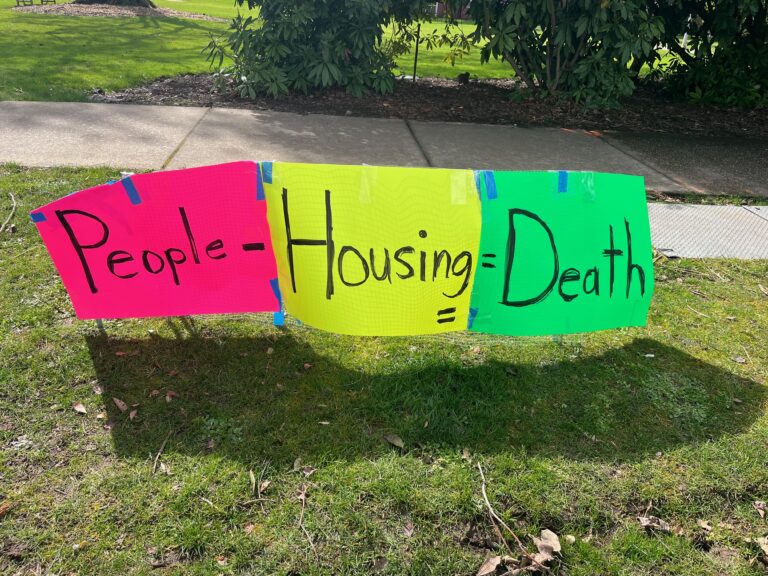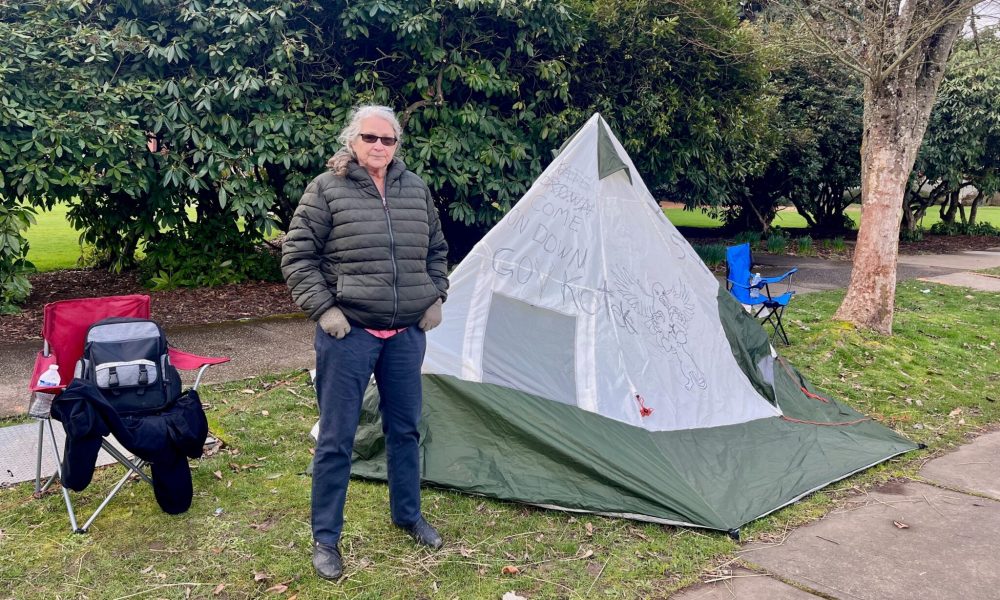Oregon is on track to spend $200 million to help homeless residents move into houses, give people who have fallen behind on rent more time to pay and create new goals for cities to build homes under a pair of measures approved Wednesday by the state House.
House Bill 2001 and House Bill 5019 passed on 50-9 and 49-10 votes, respectively, with only Republicans opposed. The bills now head to the Senate, where a vote is expected early next week. If they pass, as predicted, Gov. Tina Kotek is expected to sign them.
The measures are an initial step toward addressing the state’s homelessness crisis and housing shortage, supporters said. At least 18,000 Oregonians are homeless, according to the U.S. Department of Housing and Urban Development, and many more live precariously, struggling to make rent or mortgage payments on unaffordable homes. The state needs to build roughly 550,000 new homes over the next two decades after years of building fewer homes than needed for the state’s growing population, according to the Oregon Department of Land Conservation and Development.
“This is a decades-long deficit that won’t be fixed in one year,” said Rep. Maxine Dexter, D-Portland and chair of the House’s housing committee. “We have much work to do.”
The roughly $200 million total in the two bills would be split between the current budget, which ends June 30, and the new two-year budget that begins July 1. Lawmakers are likely to allocate more money toward housing and homelessness when they introduce a full budget for the next two years later this spring.
Lawmakers also may continue tweaking some policies, including changes to the state’s land use system. Kotek has set a goal of building 36,000 new homes per year and last week convened a council that is expected to produce a plan for how to meet that goal by April 1.
Along with providing more money, the bills would extend eviction notice periods for missing rent from three days to 10 days, giving renters more time to catch up on late rent. They also would require Oregon Housing and Community Services to give each city with more than 10,000 residents an annual target for building new subsidized and market-rate homes. The state would help cities meet the state’s goals and could punish recalcitrant cities by forcing them to forfeit grants or other state funding.
That aspect caused some Republicans, including Rep. Ed Diehl, R-Stayton, to vote against the measures. Diehl said cities should be able to make their own decisions about where and how to grow.
“It basically says to cities, you’re going to grow and you’re going to do it our way,” Diehl said.
Republican Reps. Shelly Boshart Davis of Albany, Jami Cate of Lebanon, Christine Goodwin of Canyonville, Emily McIntire of Eagle Point, Lily Morgan of Grants Pass, Virgle Osborne of Roseburg, E. Werner Reschke of Klamath Falls and Brian Stout of Columbia City joined Diehl in voting against both bills. Rep. Rick Lewis, R-Silverton, voted against the funding in HB 5019 but for the policy changes in HB 2001.
Reschke said it wasn’t prudent to spend hundreds of millions of dollars early in the legislative session in an uncertain economy. He also opposes the state’s focus on getting people into housing before focusing on mental health or addiction issues that can contribute to homelessness.
“When a person is given a home with no responsibility or accountability, all we have done is move the problem indoors,” Reschke said.
Rep. Emerson Levy, D-Bend, recounted that a former mayor of Bend, Craig Coyner, recently died homeless. He was a city leader and the great-grandson of another mayor, a prosecutor and defense attorney respected in the Deschutes County courthouse. But after his wife died and he lost his house to foreclosure, he ended up on the streets, battling alcoholism and the elements before he died on Valentine’s Day, frostbitten and barely able to move after a stroke.
“It’s a reminder that we are all human, subject to the difficulties that may find us,” Levy said.

A death sentence
Across the street from the Capitol, 73-year-old Jean Hendron waits to talk to anyone who will listen about the human toll of homelessness. Hendron, a retired Washington state employee, has spent the past three years working with homeless people in Salem, handing out food, taking them to hospitals and doing what she can to connect them with the meager resources available.
This week, Hendron bundled up for the crisp March air and set up a tent, camp chair and set of posters with the equation “people minus housing equals death” facing the Capitol steps. Anyone entering or leaving the building can see her, and anyone who stops to talk to her hears about her reason for being there: a 38-year-old paraplegic man sleeping in Salem’s Wallace Marine Park.
Hendron brings him meals and has brought him to hospitals several times to treat a wound on his buttocks, but the wound keeps getting worse because he returns to a cot in a public park and can’t prevent infection. He doesn’t want to keep returning to the hospital only to be patched up and kicked back on the street, Hendron said, so now she’s outside the Capitol trying to get someone with power to pay attention.
So far, a couple lawmakers or aides have stopped, and Hendron expects to have a longer conversation with Rep. Mark Gamba, D-Milwaukie, sometime soon, she said Wednesday. She has many stories to share with them of people who didn’t find help because of physical or mental disabilities and died on the streets.
“I’m just standing at the edge of the river, grabbing people by the hand and throwing them out on shore and praying to God that they stay there and stay safe,” she said. “I’m exhausted.”
‘A few bites’
Most lawmakers who voted for the bills acknowledged that they wouldn’t be enough to solve the homeless crisis, but they were optimistic about the ways they could help people around the state.
Rep. Jeff Helfrich, R-Hood River and the vice chair of the housing committee, said a $5 million appropriation to help farms improve housing conditions for farm workers is especially important for his district in the Columbia River Gorge. Fruit growers in his district employ nearly 10,000 people during peak seasons, and more than half live in farm housing.
Rep. Pam Marsh, D-Ashland, noted that many families in her district are still living in emergency trailers after they lost their homes to the Labor Day fires in 2020. She’s most excited about a $20 million appropriation to develop modular housing, which she described as the only strategy that would help the state do better in the next crisis.
Marsh, who owns several rental properties, said a provision of the bill extending eviction notices from 3 days to 10 days makes sense for both renters and landlords.
“Sometimes it takes a few extra days for a cash-strapped tenant to come up with the rent,” she said. “And frankly, no landlord wants to evict a tenant who is doing their best.”
Rep. Andrea Valderrama, D-Portland, described how her community in northeast Portland was ripped apart when everyone in her apartment complex received notices of 25% rent increases. Valderrama and others who could afford to move did – she ended up living 30 minutes away – and others struggled to continue paying the increased rent.
A 2019 law prohibits landlords from raising rent by more than 7% plus inflation, although buildings newer than 15 years aren’t subject to the law. Families can still be evicted for falling behind on rent, and Valderrama said giving them more time to find rent assistance would help prevent people from being displaced.
“Children deserve to stay in schools,” she said. “Families deserve to stay in communities.”
Rep. Kevin Mannix, R-Salem, said the Legislature still has much more to do to address the affordable housing issue, but that the legislation was a start.
“Sometimes it takes a few bites at the sandwich to finish the sandwich,” he said. “So we’ll take a few bites today and move forward.”
Where the money goes
- $85.2 million to rehouse people experiencing homelessness and expand shelter capacity in the Portland area, central Oregon and Lane, Jackson, Marion and Polk counties, which are subject to Kotek’s January emergency order. The money is intended to create 600 new shelter beds and rehouse 1,200 homeless people.
- $33.6 million to help nearly 9,000 households avoid homelessness.
- $27.4 million to address homelessness in the 26 rural counties that weren’t included in Kotek’s January emergency order because homelessness has increased at slower rates there than in urban areas. The money is intended to add 100 shelter beds and rehouse 450 people.
- $24.9 million for homeless youth, to help young people and their families with rent assistance, shelter and mental health or substance abuse treatment.
- $20 million to encourage production of modular homes, which are built in factories and then placed in foundations or stacked to make apartment buildings.
- $5 million for Oregon’s nine federally recognized tribes to help tribal members experiencing homelessness.
- $5 million in grants for farmers to improve health and safety conditions at farm worker camps.
- $3 million in revolving loans builders can use to pay for predevelopment costs, such as permits and local infrastructure fees, for homes that will be affordable to people earning between 80% and 120% of the median income in their area.
- $2.3 million for cities and counties to use for sanitation services.
- $1.6 million for the state Office of Emergency Management and Oregon Housing and Community Services to coordinate the state’s handling of the homelessness crisis.
- $200,000 to develop a long-term statewide rent assistance program.
Oregon Capital Chronicle is part of States Newsroom, a network of news bureaus supported by grants and a coalition of donors as a 501c(3) public charity. Oregon Capital Chronicle maintains editorial independence. Contact [email protected]. Follow Oregon Capital Chronicle on Facebook and Twitter.

Julia Shumway is deputy editor of Oregon Capital Chronicle and has reported on government and politics in Iowa and Nebraska, spent time at the Bend Bulletin and most recently was a legislative reporter for the Arizona Capitol Times in Phoenix. An award-winning journalist, Julia most recently reported on the tangled efforts to audit the presidential results in Arizona.









